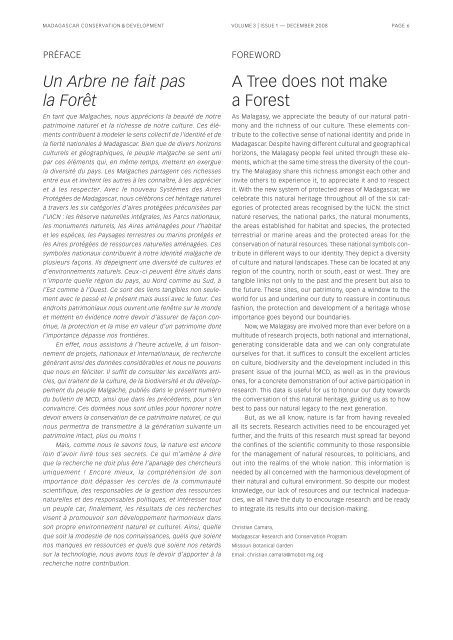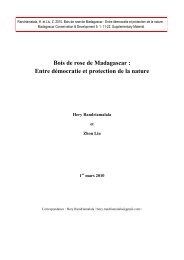Journal Madagascar Conservation - Madagascar Wildlife ...
Journal Madagascar Conservation - Madagascar Wildlife ...
Journal Madagascar Conservation - Madagascar Wildlife ...
You also want an ePaper? Increase the reach of your titles
YUMPU automatically turns print PDFs into web optimized ePapers that Google loves.
MADAGASCAR CONSERVATION & DEVELOPMENT VOLUME 3 | ISSUE 1 — DECEMBER 2008 PAGE 6<br />
PRÉFACE<br />
Un Arbre ne fait pas<br />
la Forêt<br />
En tant que Malgaches, nous apprécions la beauté de notre<br />
patrimoine naturel et la richesse de notre culture. Ces éléments<br />
contribuent à modeler le sens collectif de l‘identité et de<br />
la fierté nationales à <strong>Madagascar</strong>. Bien que de divers horizons<br />
culturels et géographiques, le peuple malgache se sent uni<br />
par ces éléments qui, en même temps, mettent en exergue<br />
la diversité du pays. Les Malgaches partagent ces richesses<br />
entre eux et invitent les autres à les connaître, à les apprécier<br />
et à les respecter. Avec le nouveau Systèmes des Aires<br />
Protégées de <strong>Madagascar</strong>, nous célébrons cet héritage naturel<br />
à travers les six catégories d’aires protégées préconisées par<br />
l’UICN : les Réserve naturelles intégrales, les Parcs nationaux,<br />
les monuments naturels, les Aires aménagées pour l’habitat<br />
et les espèces, les Paysages terrestres ou marins protégés et<br />
les Aires protégées de ressources naturelles aménagées. Ces<br />
symboles nationaux contribuent à notre identité malgache de<br />
plusieurs façons. Ils dépeignent une diversité de cultures et<br />
d‘environnements naturels. Ceux - ci peuvent être situés dans<br />
n‘importe quelle région du pays, au Nord comme au Sud, à<br />
l’Est comme à l’Ouest. Ce sont des liens tangibles non seulement<br />
avec le passé et le présent mais aussi avec le futur. Ces<br />
endroits patrimoniaux nous ouvrent une fenêtre sur le monde<br />
et mettent en évidence notre devoir d‘assurer de façon continue,<br />
la protection et la mise en valeur d‘un patrimoine dont<br />
l‘importance dépasse nos frontières.<br />
En effet, nous assistons à l’heure actuelle, à un foisonnement<br />
de projets, nationaux et internationaux, de recherche<br />
générant ainsi des données considérables et nous ne pouvons<br />
que nous en féliciter. Il suffit de consulter les excellents articles,<br />
qui traitent de la culture, de la biodiversité et du développement<br />
du peuple Malgache, publiés dans le présent numéro<br />
du bulletin de MCD, ainsi que dans les précédents, pour s’en<br />
convaincre. Ces données nous sont utiles pour honorer notre<br />
devoir envers la conservation de ce patrimoine naturel, ce qui<br />
nous permettra de transmettre à la génération suivante un<br />
patrimoine intact, plus ou moins !<br />
Mais, comme nous le savons tous, la nature est encore<br />
loin d’avoir livré tous ses secrets. Ce qui m’amène à dire<br />
que la recherche ne doit plus être l’apanage des chercheurs<br />
uniquement ! Encore mieux, la compréhension de son<br />
importance doit dépasser les cercles de la communauté<br />
scientifique, des responsables de la gestion des ressources<br />
naturelles et des responsables politiques, et intéresser tout<br />
un peuple car, finalement, les résultats de ces recherches<br />
visent à promouvoir son développement harmonieux dans<br />
son propre environnement naturel et culturel. Ainsi, quelle<br />
que soit la modestie de nos connaissances, quels que soient<br />
nos manques en ressources et quels que soient nos retards<br />
sur la technologie, nous avons tous le devoir d’apporter à la<br />
recherche notre contribution.<br />
FOREWORD<br />
A Tree does not make<br />
a Forest<br />
As Malagasy, we appreciate the beauty of our natural patrimony<br />
and the richness of our culture. These elements contribute<br />
to the collective sense of national identity and pride in<br />
<strong>Madagascar</strong>. Despite having different cultural and geographical<br />
horizons, the Malagasy people feel united through these elements,<br />
which at the same time stress the diversity of the country.<br />
The Malagasy share this richness amongst each other and<br />
invite others to experience it, to appreciate it and to respect<br />
it. With the new system of protected areas of <strong>Madagascar</strong>, we<br />
celebrate this natural heritage throughout all of the six categories<br />
of protected areas recognised by the IUCN: the strict<br />
nature reserves, the national parks, the natural monuments,<br />
the areas established for habitat and species, the protected<br />
terrestrial or marine areas and the protected areas for the<br />
conservation of natural resources. These national symbols contribute<br />
in different ways to our identity. They depict a diversity<br />
of culture and natural landscapes. These can be located at any<br />
region of the country, north or south, east or west. They are<br />
tangible links not only to the past and the present but also to<br />
the future. These sites, our patrimony, open a window to the<br />
world for us and underline our duty to reassure in continuous<br />
fashion, the protection and development of a heritage whose<br />
importance goes beyond our boundaries.<br />
Now, we Malagasy are involved more than ever before on a<br />
multitude of research projects, both national and international,<br />
generating considerable data and we can only congratulate<br />
ourselves for that. It suffices to consult the excellent articles<br />
on culture, biodiversity and the development included in this<br />
present issue of the journal MCD, as well as in the previous<br />
ones, for a concrete demonstration of our active participation in<br />
research. This data is useful for us to honour our duty towards<br />
the conversation of this natural heritage, guiding us as to how<br />
best to pass our natural legacy to the next generation.<br />
But, as we all know, nature is far from having revealed<br />
all its secrets. Research activities need to be encouraged yet<br />
further, and the fruits of this research must spread far beyond<br />
the confines of the scientific community to those responsible<br />
for the management of natural resources, to politicians, and<br />
out into the realms of the whole nation. This information is<br />
needed by all concerned with the harmonious development of<br />
their natural and cultural environment. So despite our modest<br />
knowledge, our lack of resources and our technical inadequacies,<br />
we all have the duty to encourage research and be ready<br />
to integrate its results into our decision-making.<br />
Christian Camara,<br />
<strong>Madagascar</strong> Research and <strong>Conservation</strong> Program<br />
Missouri Botanical Garden<br />
Email: christian.camara@mobot-mg.org



